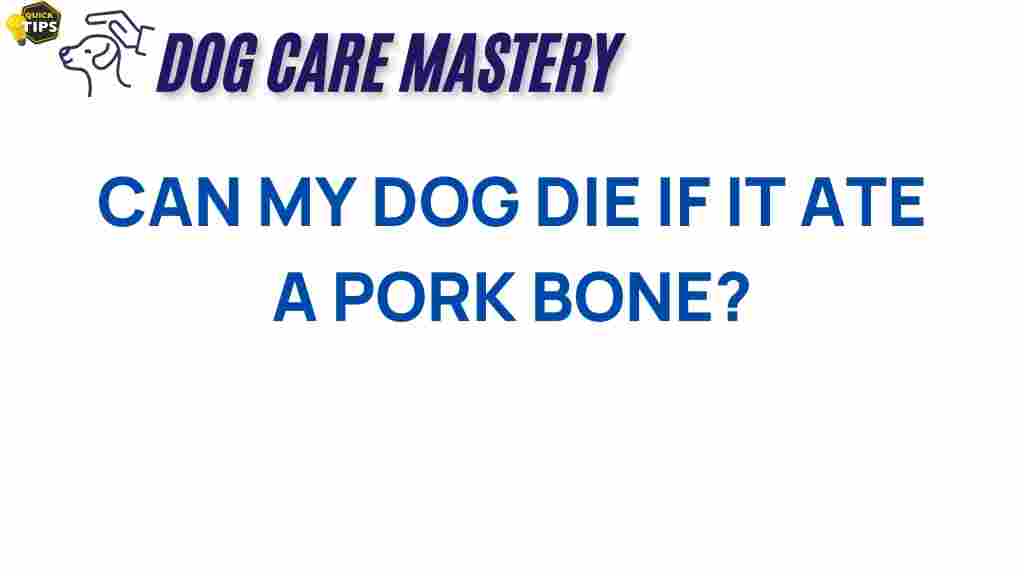The Hidden Dangers: Can Your Dog Die from Eating a Pork Bone? – Dog Health
As a responsible pet owner, ensuring your dog’s health and safety is a top priority. One common question that arises among dog lovers is whether it’s safe for dogs to chew on pork bones. While many see bones as a natural and enjoyable treat for their furry friends, the reality is that pork bones can pose serious health risks. In this article, we will explore the dangers of pork bones for dogs, how they can impact dog health, and what alternatives you should consider.
Understanding Dog Health Risks with Pork Bones
Pork bones, particularly when cooked, can splinter easily. This characteristic presents several hazards to your dog’s health:
- Choking Hazard: Splintered bones can become lodged in your dog’s throat, causing choking.
- Intestinal Blockage: If swallowed, bone fragments can get stuck in the intestines, leading to serious blockages.
- Perforation: Sharp edges can cause tears in your dog’s digestive tract, which can be life-threatening.
- Dental Damage: Chewing on hard bones can lead to broken teeth, causing pain and requiring veterinary intervention.
Why Are Cooked Bones Particularly Dangerous?
While raw bones may offer some benefits, cooked bones, including pork bones, are much more dangerous. Cooking changes the structure of the bone, making it brittle and more likely to splinter. These splinters can pose severe risks to dog health, including:
- Severe pain and discomfort
- Infections from punctured organs
- Emergency surgical procedures
Safe Alternatives to Pork Bones
If you want to treat your dog, there are several safe alternatives to pork bones that can promote good dog health:
- Raw Bones: Raw beef or lamb bones can be safer options, as they are less likely to splinter.
- Dental Chews: Many products are designed to promote dental health without the dangers of bones.
- Soft Toys: Durable chew toys can provide entertainment without the risk of splintering.
What to Do If Your Dog Eats a Pork Bone
If your dog has eaten a pork bone, it’s essential to monitor them closely. Here’s a step-by-step process to ensure their health:
- Stay Calm: Panic can lead to hasty decisions. Keep a level head.
- Assess the Situation: Determine if your dog is showing any signs of distress, such as vomiting, choking, or unusual behavior.
- Check for Splinters: If safe to do so, look inside your dog’s mouth for any visible splinters.
- Contact Your Veterinarian: If your dog shows any signs of discomfort, it’s crucial to consult a vet immediately.
- Monitor for Symptoms: Keep an eye on your dog for the next few days for any unusual behavior, including lethargy, loss of appetite, or abdominal swelling.
Common Symptoms of Bone-Related Issues
Recognizing the symptoms of potential complications is vital for dog health. Here are some signs that your dog may be in trouble:
- Vomiting, especially if it contains blood
- Diarrhea or constipation
- Abdominal swelling or pain
- Refusal to eat or drink
- Lethargy or unusual behavior
When to Seek Emergency Care
In certain situations, immediate veterinary care is necessary. You should seek emergency help if:
- Your dog is choking.
- There are signs of severe pain.
- Your dog is unresponsive or lethargic.
- Your dog has a swollen abdomen.
Preventing Future Incidents
To maintain your dog’s health and safety, follow these preventive measures:
- Educate Yourself: Understand which foods and bones are safe for your dog.
- Provide Proper Chews: Always select dog-friendly chew toys and treats.
- Supervise Chewing: Keep an eye on your dog while they are chewing to prevent any accidents.
- Regular Vet Checkups: Routine vet visits can help identify potential health issues early.
Conclusion: Prioritize Dog Health Over Treats
While giving your dog a treat can be a rewarding experience, it’s crucial to prioritize their health and safety. The risks associated with feeding pork bones far outweigh the benefits. By understanding the potential dangers and opting for safer alternatives, you can ensure a long and healthy life for your dog. If you want to learn more about keeping your dog healthy, check out this comprehensive guide on dog health.
Remember, a careful and informed approach to your dog’s diet can prevent accidents and promote their overall well-being. Be vigilant, educate yourself, and always consult your veterinarian if you have any doubts about your dog’s dietary choices.
This article is in the category Safety and created by dogcaremastery Team
